Before we entertain you with our team members’ favorite expressions and the moments when they fall back into their native language, here is some background information about this “holiday”.
What is a mother tongue anyway?
The first language learned is usually referred to as the mother tongue. It does not necessarily have to correlate with one's origins, but can be a language with which one identifies or which one uses most often. It can change with life circumstances, so that the first language learned is no longer necessarily used as the mother tongue. Children who grow up in multilingual families often develop two or even three languages that they use as their mother tongues.
Why is Mother Language Day important at all?
Linguistic diversity is a key component in building and maintaining inclusive, open and diverse societies because languages convey information and knowledge and promote development.
Today, however, over 50 percent of the 6,700 languages spoken worldwide are threatened with extinction. On average, a language is lost every two weeks, and with it a piece of cultural and intellectual heritage. What is particularly interesting is that many languages are not even present on the Internet, which is so important today. This day is also intended to draw attention to minority languages with fewer than 10,000 speakers. Often these languages are no longer passed on to subsequent generations and are therefore forgotten. It is also particularly unfortunate that many languages with fewer than 100 speakers are not even recorded or documented.
background
Historically, International Mother Language Day refers to February 21, 1952. At that time, the people of the Pakistani province of Bengal protested against the introduction of Urdu as the official language. Bengali, which was widely spoken among the population, was to be pushed back. Almost 20 years later, East Bengal became independent as Bangladesh and introduced Bengali as the official language.
But now let’s talk about the different native languages in our team.
Adi – Hebrew
There is a word in Hebrew that is truly missing in all other languages I know.
The word " Titchadesh ". The literal translation is "Be new", but it is actually a word you say to congratulate someone who has something new in their life. It suits most situations and the best thing about the word is that it is completely neutral!
Example: someone has a new haircut, shoes, house, tattoo, pet. If you say “ Titchadesh ” to someone’s new haircut,
you just congratulate someone on their new haircut without expressing an opinion about it. You can think to yourself that it looks terrible but still say " Titchadesh ".
I resort to my native language when I am talking to my cat or when I am somehow distracted, e.g. when I am watching a movie, I may find myself saying something in Hebrew (it has happened several times that I was speaking Hebrew to my boyfriend and I was not sure why he was not responding).
I've also been told that I talk in my sleep, apparently in Hebrew.
Maria – Portuguese
As with any other language, in Portuguese we have many expressions that lose their true meaning (and even become very funny!) when translated into another language. Some examples, translated literally into English:
TIRA O CAVALINHO DA CHUVA! – “Take your little horse out of the rain!” (makes no sense, does it?!) – it means “Don’t you dare do that!”
ESTAR COM OS AZEITES – “To be with the olive oils” – it means “to be in a bad mood, angry, irritable”
Although I speak Portuguese every day with my family at home, I confess that I always like to talk a little more when I meet Portuguese people on the street, at concerts, in cafes or on public transport. Often with someone who doesn't speak Portuguese but is interested in learning more about my language, my country, about music, cinema and our culture.
Marta – Slovak
My favorite sentence/expression: “ Dvakrát meraj a raz rež. ” Translated one-to-one into English: “Measure twice and cut once.”
The meaning is that you should think twice before doing/saying something.
I dream in Slovak and swear in Polish. I have no idea why. Maybe because Polish is like my second mother tongue.
Valentina – German/Irish
I grew up bilingual and I love the Irish phrase: “ The craic was 90! ” It means it was really fun and usually refers to a night out or something similar. 90 makes me smile as it seems there could have been 10% room for possible improvement on the “fun barometer”.
I usually resort to English or Irish when the term I'm looking for simply doesn't exist in German, or when there's something like a regional dialect that makes sense to mention in the context or story.
Kamila – Polish
Fortunately, all of my favorite expressions can be translated into German. But there is one saying that I particularly like:
Pospiech jest zlym doradca. Translated, this means: A hasty person is a bad advisor (because mistakes almost always occur in a hurry, or in a hurry one often makes the wrong decisions).
I always fall back into my native language when I have to count something quickly.
Eszter – Hungarian
Hungarian is a very rich language. We have many, many words and expressions with different shades to say the same thing. But for me the most beautiful word is édesanya – mother. In Hungarian it is a compound word. If I translate it into English, it literally means sweet/dear mother: édes =sweet,dear + anya =mother
I mostly speak Hungarian when I am in contact with my family or Hungarian friends. A funny fact is that my husband and I use my mother tongue as our common language, even though he is Swiss and his mother tongue is Swiss German. However, he lived in Hungary for 10 years and learned this very difficult language. Another moment when I use my mother tongue is when I "talk" to my inner self.
Anna – Austrian
I have quite a few sayings in store. Here is a small selection of my favorites:
Bock mas Fadl bei de Haxn und haun ma si über d'heisa literally means: Let's grab the piglet by the feet and throw ourselves over the houses and means "Let's set off (and go home, for example)."
Schaun ma moi, daun seng ma schau literally means: Let’s take a look, then we’ll see and means “We’ll see what time brings.”
Do hauts da de Zepferl um d'Eawaschl! literally means: It knocks your pigtails around your ears and means: “It's unbelievable!”
I fall back into my beloved "farmer's dialect" especially when I'm swearing or annoyed about something, or when I have to describe complicated processes and don't have the standard German words to do so. After a long, hard day at work or when I'm stressed, I often switch to Austrian. In most cases, however, I only realize afterwards that I'm using my Austrian jargon. The confused and often amused looks and reactions of the person I'm speaking to make me realize that my German conversation partner hasn't understood a word of what I'm saying.
What is your native language and your favorite expression and in which everyday moments do you fall back into your native language? Write us a comment and make us smile!”





